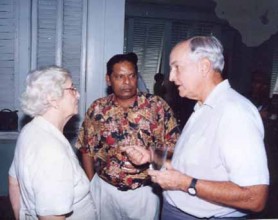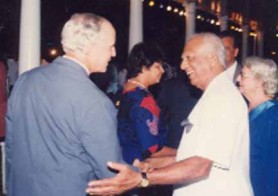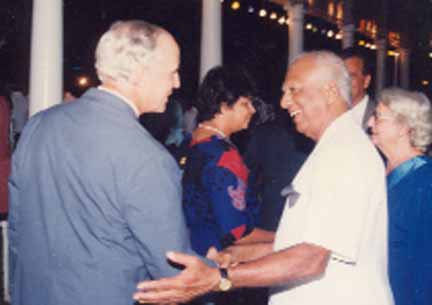(Excerpt)
At Stabroek News, we did our best to cover the events of the day (1997 election and its aftermath) as accurately as we could, given the exigencies of the situation. We tried to adopt a responsible editorial position. In a crisis, politicians make reckless allegations, often without proof, and accuse each other of promoting riots and organising bombings. How much of this does one report, even with the usual disclaimer from the other side? It is not an easy question. Getting the facts is often difficult. Does one report allegations contained in party press releases?
…We had several reporters on the road with the protesters every day and tried to give detailed first-hand coverage of these events in which, for example, the protesters would assemble outside ministries and call on employees to leave work and join the protests. There were allegations of intimidation and it was important to try to get the best possible evidence of what took place.

But there are limits. There were reports and allegations of many different things, including police brutality. In keeping with normal journalistic principles we only reported incidents for which we had credible evidence, though in a crisis this is sometimes easier said than done. Where politicians made provocative statements at public meetings, such as threatening to make the country ungovernable or appealing to kith and kin in the disciplined services, that created another kind of problem. Did reporting such statements, made in the presence of thousands of people, make the situation worse? Should they be reported?
We had another decision to make. A wide-ranging debate arose in our correspondence columns both before and after the elections, as it had done in the previous elections in 1992, on all aspects of the racial problems in the society. There were letters urging constitutional reform in an effort to deal with the racial problem. There were letters alleging discrimination in many areas… Our position, based on attitudes formed from the time we started publication in 1986… was that letters raising important but controversial issues should be published in the interest of free speech and in the hope of stimulating debate, which they frequently did, once they were reasonably balanced and factual.
When we commenced publication the state had had a monopoly of the media for well over a decade, news was censored and public opinion had atrophied. We were trying to recreate the habit of free speech and that is the milieu in which we developed. So the letters were edited to remove offensive passages when necessary. But we decided that there were real and vital issues involved in our multi-racial society that should be discussed openly even though they were sensitive, and the dialogue was sometimes useful and stimulating and led to calls, for example, for fair employment legislation, a race relations commission, a wider based and more transparent tender board, constitutional reform to end the winner-take-all system and promote power sharing and historical analysis of how various situations had come about. The level of the debate was often not as incisive or as objective as one might have wished in an ideal world. But at the end of the day people were saying what they felt, and I believe something valuable emerged. But it does place a great strain on the editing process as some letters require the most careful consideration and equally careful editing to retain the essence of what they are saying without the venom and the spite. Over the years I have spent an enormous amount of time editing letters.

This free speech we believe in is both an essential part of a free society and a potentially dangerous weapon. Giving a young, untrained and indisciplined journalist a microphone in the midst of a crisis can be as lethal as giving him a machine gun. In America, of course, because of the First Amendment even hate speech is protected unless it offends some particular law, so that Nazi sympathisers were allowed to march through a Jewish district. This is an extreme position. But where does freedom end? Do you, for example, give freedom to the fascist and publish his views even though he does not believe in freedom and will stamp it out if he gains power? Do you publish views that you disagree with profoundly and find offensive? Do you allow letter writers to deal with sensitive topics in the hope that this will shed light on them rather than provoke negative reactions? There are no easy answers and there is no golden rule showing you where to draw the line. The expression of violent and undemocratic views and the purveying of wild and inaccurate information is, of course, the ultimate test for the liberal belief in free speech.
The problem is discussed in issue No. 1 of 1998 of Index on Censorship, where they look at, to quote from their editorial, “old style hate radio in Rwanda and the new language of hate in the USA, at media hate speech in former Yugoslavia and the banning of revisionist Holocaust history in Germany,” and ask the soul-searching question, especially for a magazine dedicated from its birth in 1992 in response to pleas from Russian dissidents to opposition to censorship, “whether there are circumstances in which speech must be censored or even criminalised.” You have your basic beliefs and you make your best judgment. But it has been a sobering and difficult experience.
I would like to end with three quotations, one from the English scholar and poet, John Milton’s Areopagitica, a famous speech in 1644 in response to an Order of Parliament requiring the licensing of all books and a charge filed against him thereunder, the second from Judge Learned Hand in the case of United States v Associated Press and the last from John Stuart Mill, the English philosopher.
Milton said in opposing censorship: “Nor is it to the common people less than a reproach; for if we be so jealous over them, as that we dare not trust them with an English pamphlet, what do we but censure them for a giddy, vicious and ungrounded people; in such a sick and weak state of faith and discretion, as to be able to take nothing down but through the pipe of a licenser? That this is care or love of them, we cannot pretend, whereas, in those popish places where the laity are most hated and despised, the same strictness is used over them. Wisdom we cannot call it, because it stops but one breach of license, nor that neither: whereas those corruptions, which it seeks to prevent, break in faster at the other doors which cannot be shut.”
The First Amendment, said Judge Learned Hand, “presupposes that right conclusions are more likely to be gathered out of a multitude of tongues, than through any kind of authoritative selection. To many that is, and always will be, folly; but we have staked upon it our all. “
And John Stuart Mill wrote in his essay on liberty: “To argue sophistically, to suppress facts or arguments, to mis-state the elements of the case, or misrepresent the opposite opinion… all this, even to the most aggravated degree, is so continually done in perfect good faith, by persons who are not considered, and in many other respects may not deserve to be considered, ignorant or incompetent, that it is rarely possible, on adequate grounds, conscientiously to stamp the misrepresentation as morally culpable and still less could law presume to interfere with this kind of controversial misconduct.”

